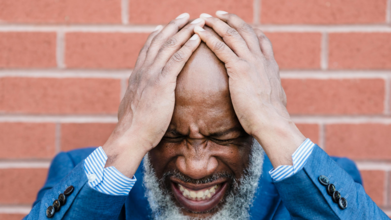
Credits: Pexels
World Alopecia Day: Expert Tips on Detecting and Managing Hair Loss
Alopecia is a common skin disease. The word ‘alopecia’ means bald. It is an autoimmune disease that attacks your body’s hair follicles and causes hair loss. There are various kinds of alopecia which may affect hair loss in different ways.
Alopecia areata totalis means you have lost all your hair from your scalp. Whereas alopecia areata universalis means you have lost all your hair from your scalp and your body. Diffuse alopecia areata means hair thinning and ophiasis alopecia areata means that you lose a band of hair or from the bottom back side of your scalp.
How does it happen?
Dr Rinky Kapoor with 18 years of experience as a dermatologist says, “It can be triggered by factors like genetics, autoimmune issues, hormonal shifts, stress, nutritional deficiencies, physical damage to the follicles, or certain medications.”Your immune system attacks your hair follicles because it thinks they are foreign elements such as bacteria, viruses, parasites on fungi, which can cause infection or illness. As a result, your hair starts to fall. Sometimes, it can be genetic too that can trigger your body’s autoimmune reaction.
The good news is, alopecia is not contagious and there are ways you can manage it.
How do we detect it?
You might notice hair thinning, patchy bald spots, or more hair than usual in your brush or shower. If you see these signs, it is an indication that you must visit a doctor. Consulting a healthcare professional is important if the hair loss is significant, sudden, or comes with scalp discomfort like itching or redness. “Early detection and treatment can help address the underlying causes and potentially reverse the hair loss,” says Kapoor.Impact on Mental Health
Talking about its impact, Kapoor says, “hair loss can feel like a personal failure, a visible sign of ageing or illness that you cannot hide. It’s not uncommon to experience a significant blow to your self-worth, believing you are less attractive or desirable. This can lead to a vicious cycle of social anxiety, where the fear of being judged or pitied causes you to withdraw from social interactions, further isolating yourself and intensifying feelings of loneliness and depression.”Why is it a taboo?
The psychological burden is heavy, with many people saying their hair loss is one of the most distressing experiences of their lives. The pressure to maintain a certain appearance makes hair loss a deeply stigmatising condition.“Despite growing awareness, many people still find it difficult to talk about it due to the emotional and psychological impact it can have. Hair loss is often associated with aging, illness, or loss of attractiveness, making individuals reluctant to share their experiences. The stigma surrounding alopecia can lead to feelings of shame and embarrassment, causing people to suffer in silence rather than seek support or treatment. This reluctance can prevent open conversations and perpetuate misconceptions about the condition,” says Kapoor.
Treatment is Available
Conventional treatments include medications like minoxidil and finasteride, hair nourishing supplements etc. which help stimulate hair growth and prevent further loss. For those requiring more targeted interventions, innovative treatments such as PRP therapy, microneedling, and low-level laser therapy (LLLT) have shown good results.“Hair science has now advanced and there are clinically-proven formulations like QR678 Neo containing biomimetic polypeptides that mimic natural hair growth factors, effectively reviving hair follicles and promoting growth, without the pain and inconvenience of the other modalities. PRP therapy involves injecting concentrated platelets into the scalp to stimulate hair growth, while microneedling induces growth factor release. LLLT uses light energy to enhance hair density,” remarks Kapoor.
She also suggests that lifestyle changes, treatment of underlying hormonal disturbances or nutrient deficiencies, and preventive measures are crucial.
“Maintaining a balanced diet rich in vitamins and minerals, managing stress levels, and avoiding harsh chemical hair styling aids can help reduce the risk of hair loss. Regular scalp massages and the use of mild shampoos may also support overall hair health,” she says.

(Credit-Canva)
No Dieting, No Fasting – Intuitive Eating Cues To Help You Lose Weight
When something is going wrong, your body gives you cues, it could be a physical reaction, or a feeling. These are signs that you should either change what you’re doing or abandon it. However, how does this apply to the food you eat?
Many people believe that you can lose weight only on strict diets, with rigorous workout sessions. While these can help you a lot, having a strict regime is not everybody’s cup of tea, that’s why many people follow intuitive eating- instead of following a strict diet, eating when you are hungry, it is important to understand your body’s cues like knowing for example when you feel full and are eating properly.
How Does Intuitive Eating Help?
Intuitive eating is about enjoying a meal without guilt and listening to your body. Experts say it's more about health than weight. People must stop thinking of food as "good" or "bad" instead, should focus on a balanced approach, where all foods can fit into a healthy lifestyle helping people have a better relationship with food.
Studies have shown how these eating habits have been proven helpful for people who suffer with eating disorders. In a 2020 study done by the International Journal of Eating Disorders revealed that intuitive eating had a positive effect on people who had anorexia nervosa and bulimia nervosa. Many people use food as a coping mechanism which is unhealthy and unfit for your mental health, causing weight gain and other issues. As intuitive eating helps you build a healthier relationship with food, it can also help you lose weight in the following ways:
Rejecting Diet Mentality
By stopping restrictive dieting, you reduce the cycle of bingeing and deprivation. This can stabilize eating patterns, leading to more consistent food intake and potentially helping your body find its natural weight. When you remove the stress of "diet rules" your body is better able to tell you its true hunger signals.
Honoring Your Hunger
Eating when truly hungry prevents overeating later. By listening to your body, you avoid extreme hunger that leads to poor food choices and larger portions. This helps regulate your calorie intake naturally, which can support healthy weight management.
Feel Your Fullness
Paying attention to fullness cues prevents overeating. Stopping when satisfied, not stuffed, helps regulate calorie intake. This awareness promotes mindful eating, which can lead to natural weight management over time.
Challenge the Food Police
Eliminating guilt and shame around food leads to healthier choices. When you stop labeling foods as "good" or "bad," you make decisions based on your body's needs, not emotional restrictions. This mindset supports better food choices long term.
Discover the Satisfaction
Eat foods that make you happy and feel good. If you don't like what you're eating, choose something else. Food should be satisfying. Enjoy the taste and texture. Eating should be a pleasure, not a chore.
Cope with Your Emotions with Kindness
Finding non-food ways to manage emotions reduces emotional eating. Addressing the root of emotional eating can lead to healthier food choices and potentially support weight management. This method helps to separate true hunger from emotional urges.
Make Peace with Food
Removing "forbidden" foods reduces cravings and binge eating. When all foods are allowed, you're less likely to overconsume them. This balanced approach to food can help in maintaining a healthy weight without extreme restriction.
Respect Your Body
Accepting your body as it reduces stress and promotes healthy habits. When you focus on well-being rather than weight, you're more likely to make positive choices for your health. This can lead to a healthy weight for your body.

(Credit-Canva)
Are ‘Microbreaks’ The Answer To Long Working Hour Fatigue?
Work can often become overwhelming, you have multiple tasks to complete, meet deadlines, make sure your schedule is managed well, and ensure you are punctual. While it might be similar for most corporate employees, not everyone is able to cope with a hectic schedule and taking breaks is a good solution for this.
However, in this competitive world, it can be difficult to take breaks without raising eyebrows, so does that mean you cannot work efficiently? No, but you can try microbreak!
Microbreaks are short, frequent pauses in your day. They help you avoid sitting for too long- these breaks can be less than a minute or up to 10 minutes. The idea is to give your muscles rest, especially when doing repetitive tasks. Such short breaks will help you detach from feeling overwhelmed or stressed short without interrupting your workflow.
How Often Should You Take Breaks Between Work?
Experts recommend taking 2 to 3 minutes break every 20-30 minutes during the day. For better heart health, studies suggest taking a 5-minute break every 30 minutes is recommended. This means 25 minutes of work, followed by 5 minutes of activity. Microbreaks do not have to be always planned out, it can be something as small as taking a stroll from one part of the office to the other. You can also do stretches, breathing exercises or enjoy a light conversation. Here are some benefits of taking microbreaks:
Less Muscle Pain
Short breaks can ease muscle stiffness from sitting. While more studies are needed, I found my chronic shoulder and back pain lessened. Regular movement helps prevent prolonged discomfort.
More Energy
Quick activity breaks can fight fatigue and boost your energy. Active breaks, like walking or stretching, are more effective. I felt a noticeable increase in my energy levels throughout the workday.
Better Focus
Microbreaks improve focus, especially for routine tasks. Complex tasks might require longer breaks. Short pauses refresh the mind, helping you stay alert and productive on less demanding work.
Improved Mental Health
Even brief breaks can lower stress and enhance mental well-being. Taking a few minutes to step away from work helps clear your head and reduces feelings of overwhelm.
How to Make Microbreaks A Daily Habit?
While microbreaks can be beneficial, they could also potentially disrupt workflow, making it hard to pause when deeply focused. Microbreaks may also lead to refocusing challenges, especially for those who have difficulties with attention. Plus, fitting them into your busy schedule, particularly with meetings, can be problematic.
To make microbreaks a regular habit, set reminders and keep things interesting by varying your activities. Create an activity list, choosing breaks that match how you feel at the moment. Try to stick to your schedule but be flexible; missing a break occasionally is okay, just keep trying. This could be a great new addition to your workspace and help you find new momentum.

(Credit-Canva)
Are You In Love Or Just A Dopamine Rush? What Happens To Your Body When You Are Smitten
Being in love, having somebody you deeply care for or enjoying the company of that special someone can be a great feeling- the elevated feeling of being on cloud nine and the joy it brings people yearning for a healthy and loving relationship. Everyone claims love changes people, and there are many biological bodily changes that take place when you are in love.
Here are some ways love can change the way you are.
It Gives You a Dopamine Rush
When you fall in love, your brain gets flooded with dopamine, a chemical that makes you feel really good. Harvard Health explains that when one is in love, there is a dopamine surge throughout the body, like the pleasure you get from other enjoyable activities. It's the brain's way of rewarding you, making you want to be around that person more.
It Helps You Form Strong Bonds
Oxytocin, often called the "love hormone," helps you form strong connections with others, this hormone gets released when you feel attracted to someone. This hormone plays a big part in building relationships, helping you communicate and create good memories together. It's also important for things like childbirth and sex, strengthening the bond between partners.
It Can Impair Your Judgment
When you're in love, it's hard to see your partner's flaws. Your brain kind of ignores the negative things. Harvard Health explains that love basically deactivates the neural pathways which are responsible for negative emotions. You only see the good stuff, making your partner seem perfect. It's like your brain is wearing rose-colored glasses, focusing only on the positive aspects of the relationship.
It Affects Your Fight-or-Flight Response
That nervous feeling in your stomach, the sweaty hands, and fast heartbeat? That's your body's "fight-or-flight" response. When you fall in love, your body releases adrenaline and norepinephrine. These chemicals make your heart race and give you a burst of energy.
It Affects Your Pain Receptors
A 2010 study published in PLOS One showed that love changes the way your pain response works. In the study they gave people small heat stimulants while they looked at a picture of a loved one. This connection helps reduce physical and emotional pain. It shows how powerful love and physical contact can be, providing comfort and support during difficult times.
It Affects Your Cortisol And Anxiety Levels
Falling in love can also be stressful, experts explain that our body releases more cortisol, which can make you feel anxious. This happens because your brain is dealing with a new and intense situation. It can also cause a drop in serotonin, leading to feelings of uneasiness.
It Can Cause Impaired Decision-Making
Love can make you do things you wouldn't normally do. Strong feelings of love, especially in the initial stages, can indeed impair decision-making by influencing brain chemistry and leading to heightened emotions and reduced cognitive control. This can lead to impulsive and risky behavior, as you're less worried about the consequences.
© 2024 Bennett, Coleman & Company Limited

